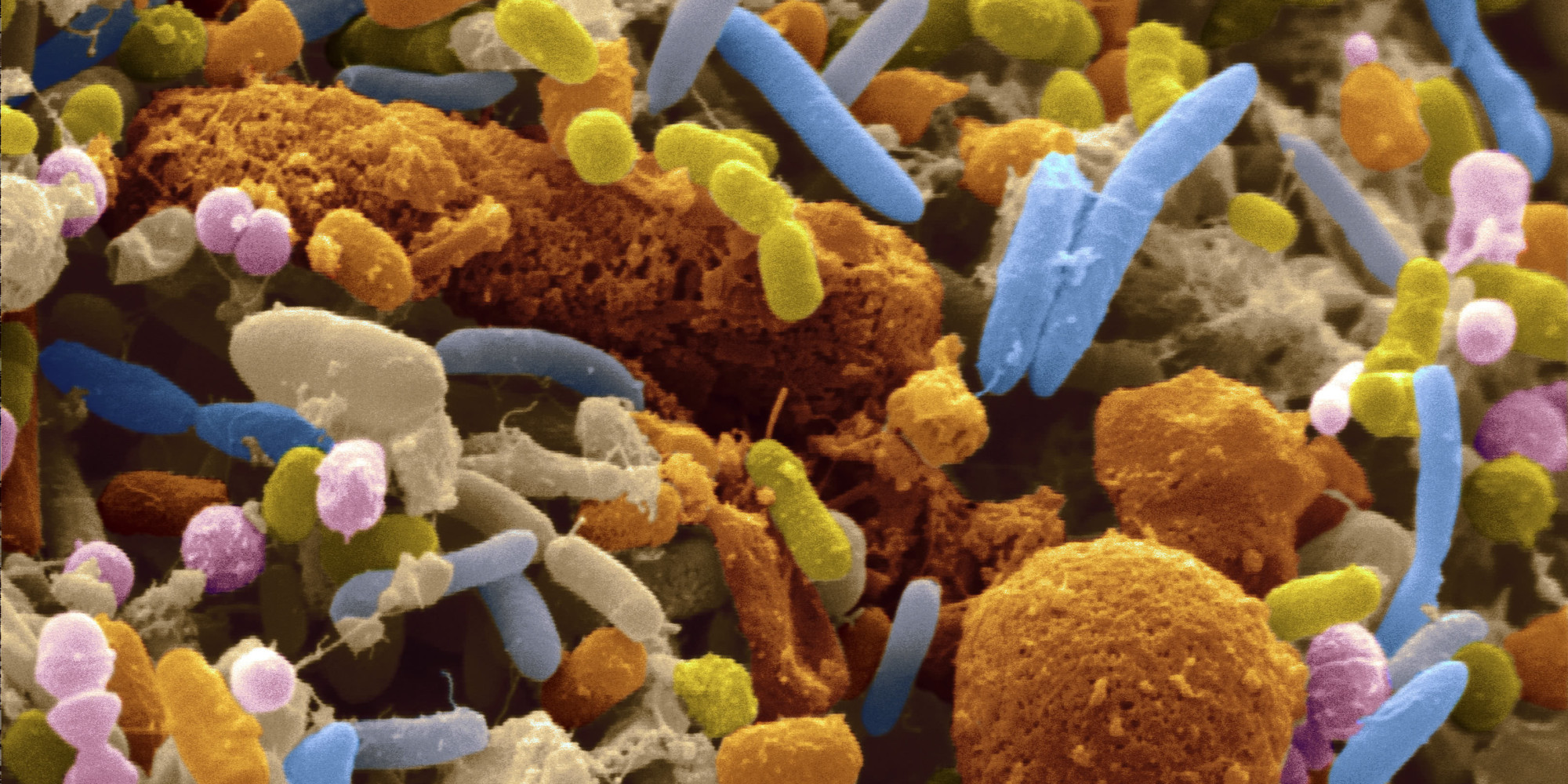
 Humans carry more bacterial cells (10 times more) than human cells - that means that you are more bacteria than you are human. It sounds gross, but it's a good thing: these little guys do a lot for us. Human gut microbes (aka gut flora) help keep the immune system healthy, and help us digest our food and absorb the necessary nutrients. Microbes in the human intestine process undigested carbohydrates into short-chain fatty acids, which are then metabolized. You can think of the human gut flora as another organ, because they perform metabolic activities like an organ would. Gut microbes also exert control over the metabolic functions of other organs, like the liver. Alterations to the gut flora of humans and mice have been associated with obesity, but the exact mechanism for how microbes influence host metabolism and adiposity (accumulation of fatty tissue), was unknown. Until now.
Humans carry more bacterial cells (10 times more) than human cells - that means that you are more bacteria than you are human. It sounds gross, but it's a good thing: these little guys do a lot for us. Human gut microbes (aka gut flora) help keep the immune system healthy, and help us digest our food and absorb the necessary nutrients. Microbes in the human intestine process undigested carbohydrates into short-chain fatty acids, which are then metabolized. You can think of the human gut flora as another organ, because they perform metabolic activities like an organ would. Gut microbes also exert control over the metabolic functions of other organs, like the liver. Alterations to the gut flora of humans and mice have been associated with obesity, but the exact mechanism for how microbes influence host metabolism and adiposity (accumulation of fatty tissue), was unknown. Until now.A new paper out of a group in Ireland, led by Drs. Susan Joyce and Cormac Gahan, has found a link between the bacterial enzyme bile salt hydrolase (BSH) and host lipid metabolism. Prior to this study, the authors had outlined the role of BSH, an enzyme limited to species of intestinal microbiota, in gut flora survival - this enzyme is an essential reaction in the metabolism of bile acids, allowing the microbes to tolerate bile, which is crucial to the digestion of fats. BSH activity is often associated with the bacteria used as probiotics for humans and animals, and is considered to be the contributing factor for their survival in the intestines. The authors took their characterization of BSH one step further by using mice to test the effect of BSH on microbe-mediated host lipid metabolism.
The mice that were used are what is known as "germ-free" mice, which means that they do not have any bacteria living in or on them (learn more here). The authors found that increasing the expression of BSH was able to regulate the expression of key genes involved in lipid and cholesterol metabolism, and gut equilibrium. These processes all play a key role in weight gain in the host. This figure below shows the weight gain, total body fat, and LDL (bad) cholesterol levels in the test mice, with the mice expressing high levels of BSH (ECBSH1) showing significantly lower levels of each:
 a 46% reduction in weight gain compared to the mice colonized with normal E. coli not expressing higher levels of BSH (EC), 60% lower LDL cholesterol, and 36.5% lower liver triglycerides. Food intake was not diminished.
a 46% reduction in weight gain compared to the mice colonized with normal E. coli not expressing higher levels of BSH (EC), 60% lower LDL cholesterol, and 36.5% lower liver triglycerides. Food intake was not diminished.What is also very interesting is that, through a whole-genome microarray analysis of the tissues of these mice, the authors found that expressing high levels of BSH also influenced the expression of genes involved in circadian rhythm. To put it simply, circadian rhythm is your body clock. That means that this gut microbe-specific enzyme is able to influence the genes that regulate sleeping and eating patterns, core body temperature, brain wave activity, hormone production, cell regeneration, and other biological activities. Now, there are a lot of genes involved in the regulation of circadian rhythm, and BSH increases the expression of two of these in the liver. But this may be an important means of cross-talk between microbes and their hosts, since alterations in circadian rhythm is also linked to alterations in energy metabolism and weight gain.
The authors posit that this may be an effective way to treat obesity globally, by targeting the human gut flora. They are currently working toward determining how this system works in humans.
Nice article! I find this interesting from a nutritional standpoint as I've learned that healthy numbers of healthy gut flora is essential for proper digestion, avoiding or treating allergies and treating or avoiding candida. Seems to me that promoting healthy gut flora by maintaining a proper diet is even more important with these new findings seeing as most people are interested in having a healthy weight as well.
ReplyDeleteThis article was a valuable piece and helped me to know the benefits on how to gain weight. Do you want to know about preventing obesity during the lockdown ?
ReplyDeleteKasratshala has many blogs on weight loss instantly at your home.